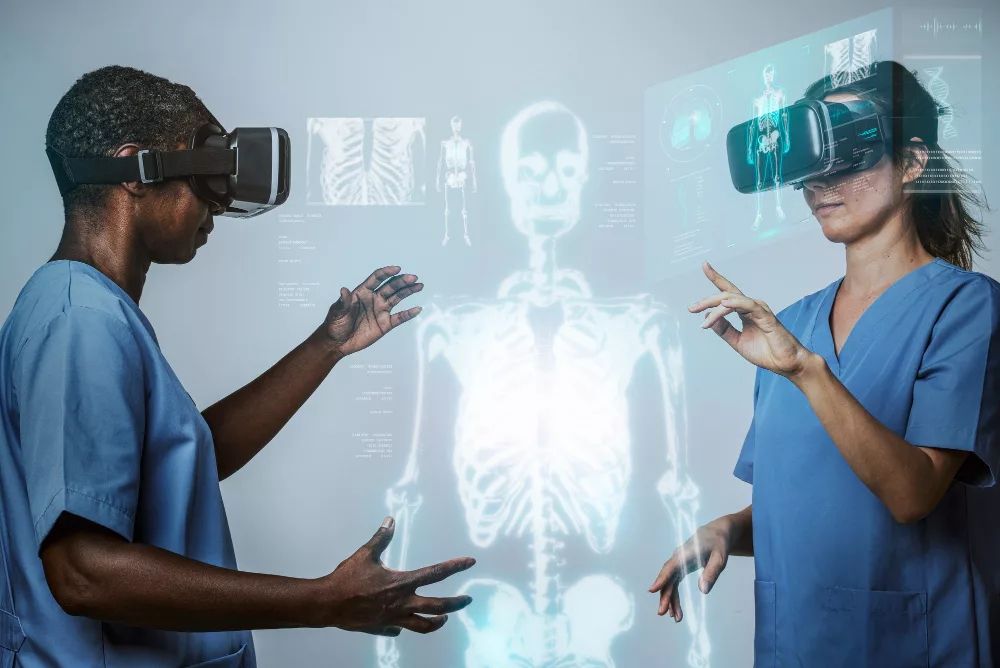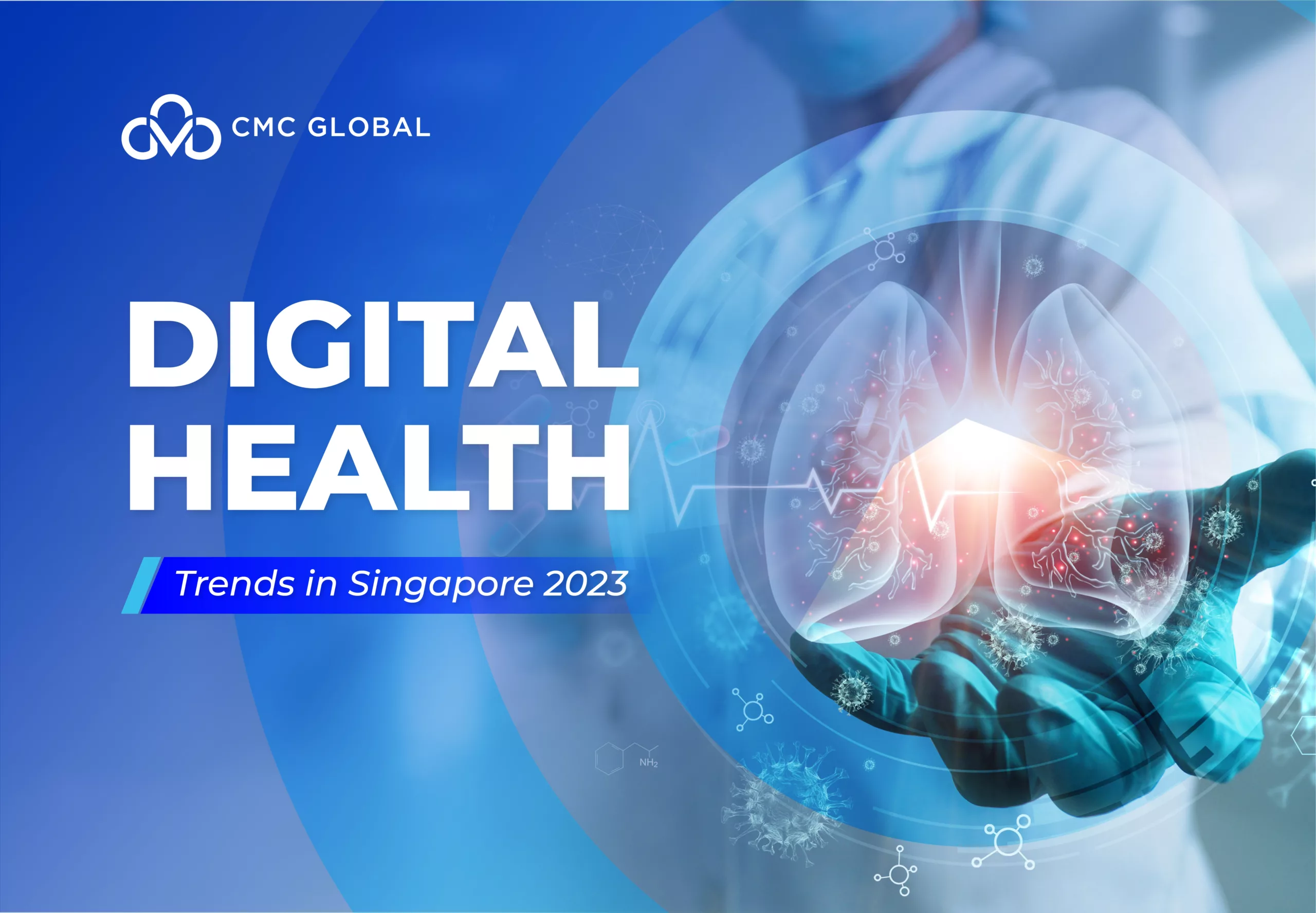The healthcare landscape has been significantly transformed in the past two years, and one aspect of the medical field that is constantly evolving is the emergence of new technology and equipment, which will have a crucial impact on the diagnosis, treatment, and care of patients. As the world continues to progress through the digital transformation journey, let’s delve into the trends that will be at the forefront of driving innovation in digital healthcare in 2023 and beyond.
#1 A Rise in the Telehealth or Telemedicine Popularity
The emergence of the global COVID-19 pandemic brought about significant disruptions in various sectors of the economy, particularly affecting the landscape of healthcare technology. With the anxiety of being infected with the virus in crowded waiting rooms, many patients were compelled to postpone their conventional doctor’s appointments. Face-to-face interactions with receptionists, nurses, and physicians also witnessed a decline.

Consequently, the demand for telehealth and telemedicine solutions experienced an unprecedented surge. Telehealth provided a means for doctors to remotely assess their patients, even with certain limitations.
Experts are now anticipating a sustained increase in the use of telemedicine in the years ahead. Notably, the costs associated with medical telehealth services soared by 265% from 2020 to 2023, skyrocketing from $29 billion to $106 billion, as reported by Healthcare Dive. Industry researchers assert that individuals suffering from chronic ailments start benefiting significantly from the expanding realm of telemedicine and telehealth services.
#2 Telemedicine to be Covered in Insurance Companies’ Policy
The growing accessibility of telemedicine has prompted insurance companies to incorporate it into their coverage offerings. What was once an occasional service has now become a standard feature within insurance programs. Numerous insurance products and plans include a wide range of virtual and telehealth services. Additionally, certain insurance plans grant individuals the flexibility to choose between virtual or in-person appointments.

Today, telehealth represents a more cost-effective approach for receiving high-quality healthcare. According to a recent report by United Healthcare, patients can potentially save more than $130 by utilizing telehealth services, and up to $2000 in comparison to the average Emergency Room visits. Furthermore, many insurance providers now furnish round-the-clock access to telehealth services.
#3 Technological Advancements Empowering Digital Health Enterprises to Enhance Sophistication
Insights earned from virtual reality and wearable platforms are equipping healthcare providers with invaluable user data, illuminating how individuals engage with technology. This convergence represents a collaborative effort across multiple industries aimed at developing more sophisticated digital health solutions.

While the existing digital health applications in the market have their own limitations concerning hardware and software, the ongoing progress in smartphone technology is contributing to the evolution of digital health assessments. These advancements offer users health insights that are not only more user-friendly but also more precise, accurate, and engaging. Some digital health companies are now providing digital diagnosis results by incorporating disposable sensors to capture and transmit accumulated data.
#4 Advancements in Artificial Intelligence (AI) and Machine Learning (ML) for Advancing Healthcare
Artificial intelligence (AI) and machine learning (ML) are simplifying and streamlining the tasks of predicting, diagnosing, monitoring, and treating patients for healthcare professionals. These technologies assist clinicians in tracking various aspects of their patients’ health, including dietary patterns, sleep patterns, weight management, and more. Furthermore, they are facilitating the delivery of personalized healthcare tailored to individual patient needs and preferences.

AI and ML are rapidly emerging as the most prominent technologies within the healthcare sector. Healthcare executives acknowledge that deep learning, natural language processing (NLP), and predictive analytics are substantially enhancing healthcare companies’ capacity to provide effective treatment, both in on-site and remote settings. According to Precedence Research, the global AI-in-healthcare market was estimated to reach $15.1 billion in 2022 and is expected to surge to $187.95 billion by 2030.
#5 Incorporating AR/VR for Immersive Healthcare Experiences
As the virtual realm gains increasing traction, software development firms are delving into the realm of three-dimensional simulations. They are harnessing augmented reality (AR) technology to complement health tech, providing healthcare professionals with immersive tools not only for information dissemination but also for enhancing patient care. Immersive technologies serve as educational aids, offering medical personnel detailed insights into a patient’s anatomy and surgical procedures. Augmented reality is also empowering surgeons with enhanced visibility of the surgical area, leading to more efficient and confident surgical procedures with fewer errors.

#6 Remote Patient Monitoring
One of the noteworthy applications of technology in the wave of digital health that should not be overlooked is its capacity to enable healthcare professionals to remotely oversee their patients. As the healthcare sector undergoes rapid transformation, digital health solutions are playing a pivotal role in improving future patient outcomes.

This trend is expected to persist and evolve in 2023, ushering in new advancements that will simplify the process for healthcare providers to employ heart monitors for recording and tracking patients’ vital signs within the comfort of their homes, thereby obviating the need for extended hospital stays. Digital health tools empower healthcare providers to closely monitor patients’ vital statistics from the convenience of their own offices.
#7 Increased Emphasis on Preventive Healthcare
Historically, healthcare has primarily focused on reacting to illnesses rather than proactively preventing them. The conventional approach involved treating ailments after they had already occurred, resulting in the accumulation of substantial healthcare expenses and suboptimal patient outcomes over time.

However, the contemporary landscape is witnessing a transformation. Individuals are adopting proactive measures to maintain their well-being. They are turning to fitness wearables and daily wellness tools to establish routines aimed at preventing chronic conditions such as diabetes, dehydration, and depression. Moreover, employers are increasingly providing wellness offerings, including access to fitness classes, meditation apps, and a heightened emphasis on overall wellness.
Wearables and digital health platforms are now equipping users with biomarkers that not only reflect their state of wellness but also indicate potential health risks. This enables users to identify health trends and preemptive risk factors at an early stage. Furthermore, the digital storage of this data simplifies sharing it with healthcare providers for a more comprehensive health assessment.
Consider digital healthcare roadmap consulting?
As more companies embrace the possibilities of digital health, navigating the complexity of implementing digital health solutions can pose significant challenges for businesses. This is where the benefits of seeking guidance from experts in digital healthcare become evident.
By collaborating with experienced consultants, businesses can fully harness the advantages of digital healthcare while sidestepping common pitfalls and positioning themselves for long-term success. An expert like CMC Global can play a crucial role in evaluating preparedness, offering technology recommendations, addressing potential risks, and ensuring the successful integration of digital healthcare solutions. Ultimately, this assistance enables businesses to unlock the complete potential of this transformative technology.
Our CMC Global team is poised to assist with:
1. Assessing business requirements and readiness
2. Crafting tailored roadmap strategies
3. Conducting technology assessments and providing recommendations
4. Developing data strategies and preparing data
5. Assisting in team formation and resource allocation
6. Identifying and mitigating risks
7. Establishing governance and compliance standards
8. Continuously assessing and improving processes
Schedule a free consultation for further details.





